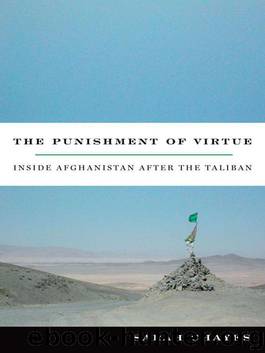The Punishment of Virtue by Chayes Sarah

Author:Chayes, Sarah [Chayes, Sarah]
Language: eng
Format: epub
Publisher: Penguin
Published: 2006-08-16T22:00:00+00:00
[Jamshid] caught sight of a city so beautiful it resembled paradise: its gates, its plain, its mountains were all gardens and cultivation. Its habitat was good, its fruits fresh, its prosperity recent, its earth joyful, its water light, its air soft. It was full of merchandise, crowds, and courageous men.2
The description didn’t fit any of the dry baked-mud towns I had seen; but perhaps things had changed since those mythical days. For what I was reading was nothing less than a creation myth—every bit as gritty and anthropomorphic and pagan as the Gilgamesh story or the Greek tales of the Titans and the Olympians.
Just after the dawn of time, according to these epic poems, King Jamshid ruled Iran. His father had subjugated the demons and the birds and evil spirits, leaving Jamshid centuries of leisure to order the affairs of men. He invented armor and textiles; he divided his subjects into the classes of priests, warriors, and craftsmen; and he set the demons to work as masons and architects.
But Jamshid grew arrogant, and “a mighty discontent arose throughout Iran.”3 Disgruntled nobles replaced him with Zahhak the Evil-Doer, from whose shoulders two serpents sprouted; they had to be fed a daily ration of fresh human flesh. Jamshid was in hiding, for Zahhak had proclaimed that whoever caught him and delivered him bound hand and foot would receive a great reward.
And so Jamshid became a ghost of the byways, a sovereign reduced to beggary, in constant flight until he reached the land of Zabulistan—roughly the region of modern Kandahar. There he fathered the dynasty of Iran’s national heroes.
It was during the eleventh century A. D., about five hundred years after the birth of Islam, that tales such as this began to be collected, translated from the archaic tongue that had conserved them, Pahlavi, and rendered into the exuberant poetry of a new language: Persian, or Farsi. This literary blossoming was part of an extraordinary Iranian renaissance that was to transform the culture of Central and South Asia over the course of the next six hundred years. It, just as much as the religion of Islam, defines the character of modern Afghanistan.
I had some familiarity with this terrain, and found myself drawing on knowledge buried since my stint in grad school as I plunged into Bosworth’s exposition.
In the early 600s, the great Persian Empire was sacked—morally and materially—by the conquests of the Muslim Arabs. They exploded on camels from the barren desert, armed with their novel religion, Islam. Iran, which included most of today’s Iraq, was the land of the king of kings and elaborate courtly culture, of complex linguistic overlays and choreographed rituals in honor of absolutism. And it came crashing down under the lance thrusts of barbarians raised on a diet of dates and milk. Nothing like this had happened to Iran since Alexander the Great tore a swathe through it about nine hundred years earlier. Even compared to Alexander’s uncouth Macedonians—rowdy drinkers and vocal egalitarians, violently suspicious of Persian hierarchy—the Arabs must have looked pretty rough.
Download
This site does not store any files on its server. We only index and link to content provided by other sites. Please contact the content providers to delete copyright contents if any and email us, we'll remove relevant links or contents immediately.
| Africa | Americas |
| Arctic & Antarctica | Asia |
| Australia & Oceania | Europe |
| Middle East | Russia |
| United States | World |
| Ancient Civilizations | Military |
| Historical Study & Educational Resources |
The Sympathizer by Viet Thanh Nguyen(4383)
The Rape of Nanking by Iris Chang(4200)
World without end by Ken Follett(3472)
Ants Among Elephants by Sujatha Gidla(3459)
Blood and Sand by Alex Von Tunzelmann(3192)
Japanese Design by Patricia J. Graham(3163)
The Queen of Nothing by Holly Black(2582)
City of Djinns: a year in Delhi by William Dalrymple(2546)
Foreign Devils on the Silk Road: The Search for the Lost Treasures of Central Asia by Peter Hopkirk(2454)
India's Ancient Past by R.S. Sharma(2450)
Inglorious Empire by Shashi Tharoor(2432)
Tokyo by Rob Goss(2425)
In Order to Live: A North Korean Girl's Journey to Freedom by Yeonmi Park(2377)
Tokyo Geek's Guide: Manga, Anime, Gaming, Cosplay, Toys, Idols & More - The Ultimate Guide to Japan's Otaku Culture by Simone Gianni(2359)
India's biggest cover-up by Dhar Anuj(2346)
The Great Game: On Secret Service in High Asia by Peter Hopkirk(2329)
Goodbye Madame Butterfly(2249)
Batik by Rudolf Smend(2176)
Living Silence in Burma by Christina Fink(2059)
